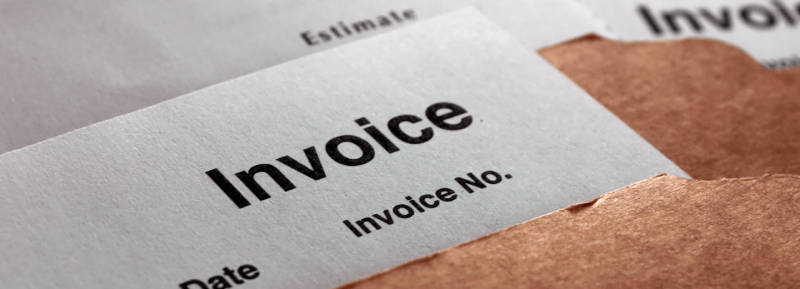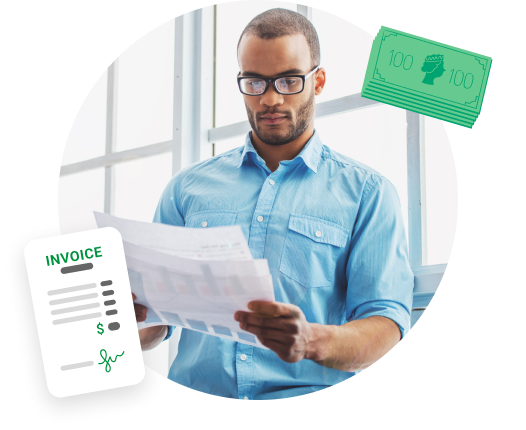
INVOICE FINANCE - invoice discounting
Invoice discounting
We're ready to help.

Waiting months for invoices to be paid can be a headache for small businesses by slowing cash flow. With limited capital available, delays can severely limit opportunities for growth as well as causing problems when it comes to paying staff and suppliers on time. With invoice discounting, you'll be able to receive the cash owed to you in outstanding invoices quickly and easily, whilst retaining complete control over the management of your sales ledger and credit control processes.
Invoice discounting is a type of invoice finance that allows small businesses to access the funds tied up in their outstanding invoices before the customer pays them. Unlike traditional business loans, invoice discounting involves using your unpaid invoices as collateral to secure a line of credit. This means that you can access the funds you need without accumulating additional debt.

Invoice discounting uses your invoices as a way to quickly access capital. The process of invoice discounting works like this:
Many businesses choose to opt for invoice discounting instead of invoice factoring as you are able to retain confidentiality about using invoice finance.
Invoice factoring involves giving the responsibility of credit control over the invoice factoring provider. However with invoice discounting, you retain the responsibility of collecting the invoice from your customers. This means your customers will not know that you are using invoice finance, helping to reduce any risk to your customer relationships.
It's essential that businesses can offer flexibility in their invoice repayment terms in order to help stand out amongst competitors. However, this can put unwanted pressure on cashflow, particularly for small businesses who are yet to accumulate adequate cash reserves. With invoice discounting, you'll be able to advance capital from these raised invoices in as little as 24 hours, with many providers now offering same day withdrawals once each account has been approved.
By retaining full responsibility of your sales ledger and credit control facilities, your customers will never deal with your invoice discounting partner. You'll continue to chase unpaid invoices and credit check new clients in exactly the same way as you do now, keeping your entire accounting operation in-house.
Every industry comes with its unique set of challenges, trends, and payment dynamics that can significantly impact a company's cash flow and financial strategies. Invoice discounting providers with specialised knowledge in a particular sector can offer tailored solutions to help your business.
Invoice discounting can be ideal for any business dealing with large volumes of invoices, looking to reduce the hassle caused by lengthy repayment terms. This accessible, flexible borrowing option is designed for businesses which already have sufficient credit control practices in place coupled with reliable, creditworthy customers
Almost any business to business invoice can be advanced through invoice discounting. There are no restrictions on what the capital can be used for. You could purchase new stock to fulfil a large order, hire new staff, or bridge a cash flow gap.
Each provider offers their own limits in terms of how much can be advanced from each invoice, with payments typically made within 24 hours of approval.
The funds will be sent directly to your business bank account once an invoice has been raised to your customer with the total amount borrowed repaid, plus interest and any accumulated fees, once the balance has been settled. You'll be able to take advantage of these services time and time again, giving you the peace of mind that you can quickly access capital when your business needs it most.
Invoice discounting lenders typically assess the creditworthiness of your customers, more so than the creditworthiness of your own business. This is because invoice discounting uses the invoice as security for the loan, so the likelihood of the lender being repaid depends on whether your customers pay your invoices. This means you could get invoice discounting even if your business has bad credit.
You can check the creditworthiness of your customers with Capitalise for Business.

At Capitalise, we work with invoice discounting specialists who understand the unique financial demands of each sector, and can use their wealth of experience to help your business draw the most value out of their sales ledger.
While both involve invoice factoring and invoice discounting use invoices to access funds, invoice discounting is more confidential. With invoice discounting, the business retains control over customer relationships and payment collection. However, invoice factoring involves selling invoices to a third party who then takes over the responsibility of collecting payments.
Invoice discounting can be confidential, meaning your customers may not be aware that you're using this financing method. This allows you to maintain your existing customer relationships and collection processes.
The cost of invoice discounting includes a fee or interest based on the time between invoice creation and settlement. Additionally, there might be administrative charges. It's important to compare these costs against the benefits of improved cash flow.
Yes, you can generally select which invoices to discount based on your immediate cash flow needs. However, some discounting providers might have minimum invoice amounts or specific criteria for eligibility. You can find out more about selective invoice finance.
Your customers will continue to make payments to you as usual. Once they settle the invoices, the invoice discounting provider releases the remaining percentage of the invoice value to you after deducting their fees.
Invoice discounting is generally a short-to-medium-term financing solution, more suitable for managing cash flow and working capital. If you're looking for long-term financing, other options like long term loans might be more appropriate.